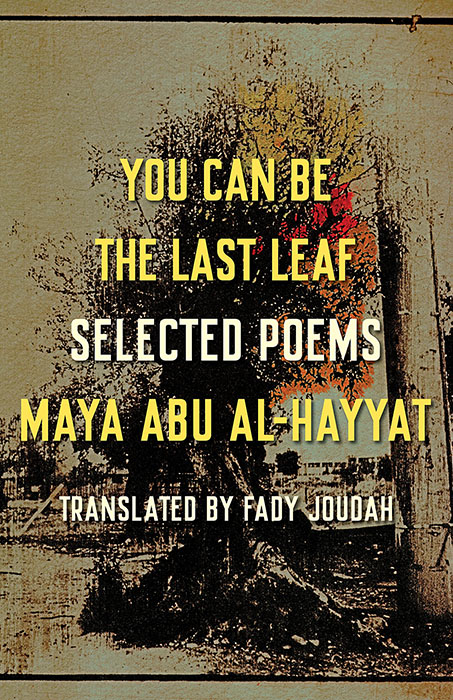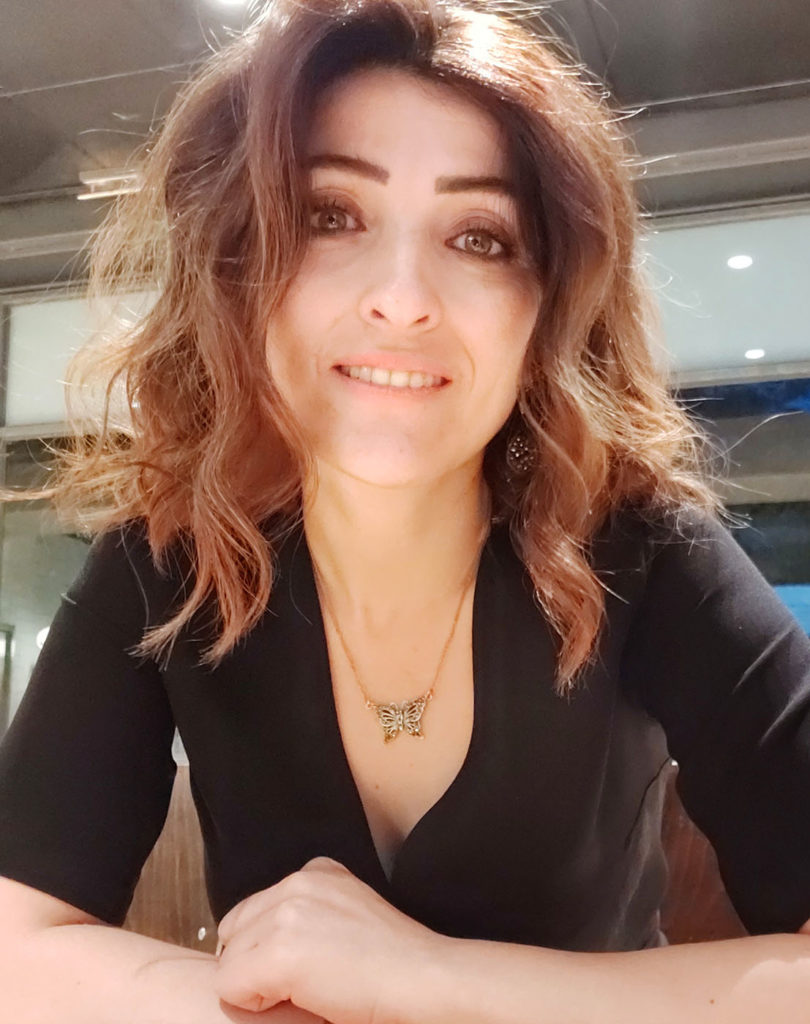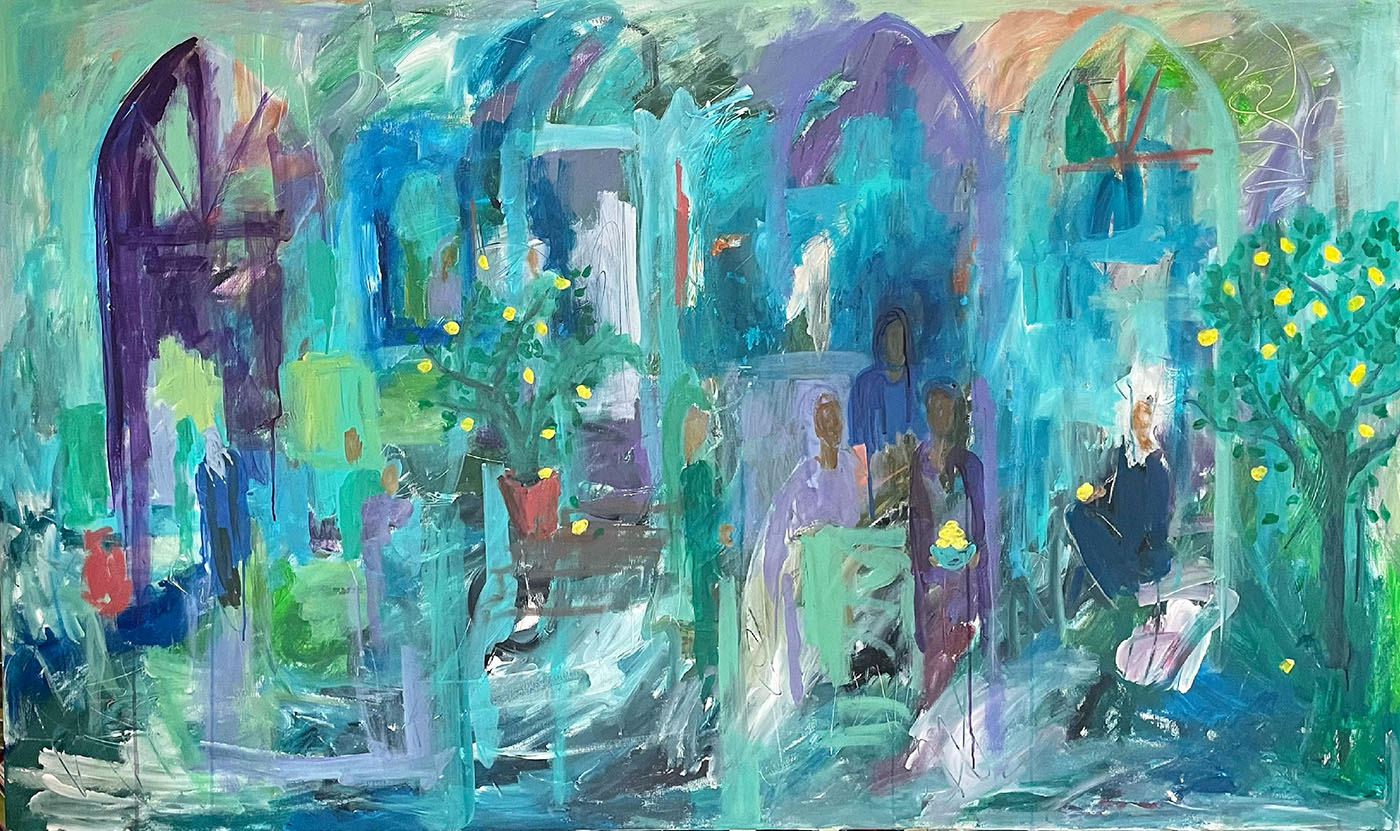You Can Be the Last Leaf, selected poems by Maya Abu Al-Hayyat
Translated by Fady Joudah
Milkweed Editions, 2022
ISBN 9781571315403
Eman Quotah
Palestinian poet Maya Abu Al-Hayyat claims she left metaphor behind years ago. “Now I betray the metaphorical with the real and direct,” she told the website Laghoo in 2015.

Translated into English by Palestinian American poet, physician and translator Fady Joudah in the new collection You Can Be the Last Leaf, Abu Al-Hayyat certainly overstates her literary infidelity. In her poems, the authorial relationship to the imagistic and the mundane feels more like coexistence or polyamory. The everyday seeps into metaphor and vice versa, a poetic register that distinctively conveys the truth of a woman, mother, and artist living under Israeli colonial rule. The reader encounters checkpoints and house dresses, loud children and gossiping friends, mosquitos and cooking shows, a tin of sewing supplies and an empty laundry basket — as well as death, hope, and fear; a woman growing like a tree; horses carrying a house; pockets full of seashells and madness.
You Can Be the Last Leaf gathers poems from three of Abu Al-Hayyat’s Arabic collections, The Book of Fear (2021), House Dresses and Wars (2016), and That Smile, That Heart (2012). We start in the domestic sphere then quickly abandon it, in the collection’s first poem, “My House.”
None of the many houses I lived in
concern me. After the third house
I lost interest, but lately my organs and body parts
have been complaining of unexplainable ailments.
My arms extend higher than a tree.
In Arabic, house means abode, family, poetry verse, but not necessarily home. For Palestinians, the house is a site of displacement, and the verse is a locus of both grief and power. The poem continues, moving into the realms of literature and engineering:
I read several texts I took for houses
and stayed in them a while: “Liquid Mirrors”
was a crazy abode in which I forgot
my first love. There were magazines, too:
Al-Karmal, Poets, and Aqwass,
then I studied engineering,
specialized in earthquakes
to build houses whose foundations
resist climates and the unpredicted.
The poem ends with a declaration of possibility for the idea of the house, its mobility and mutability: “I will raise my house on the backs of horses/that will carry it to the fields,/there my legs will pause.”
The house is metaphorical, and also very real.
In the four-part poem “Return,” Abu Al-Hayyat takes on another symbol of Palestinian desire and dispossession — the roads that lead from a lost past to present Israel, from Palestine to not-Palestine, and from one part of historic Palestine to another.
On Highway 6
between Tel Aviv and Jerusalem,
drivers pay a toll for the well-paved road,
busses on either side
transport passengers who’ve returned at last
to Ramleh or Lod, the latter in peace, with jars
for the holy festival of Prophet Saleh.
Justice was walking on the shoulder
of the rod outside the yellow line
giving back to the streets their names.
The “real and direct” language of “pay a toll” suggests the metaphorical toll of Palestinian dispossession. “Well-paved road,” “peace,” “returned at last” all suggest their own absence. Later in the poem, a girl named Mercy leans on a rented cane. Years “roll under the bed” and “need clips the wings of dreams/and the legs of the righteous.”
In this collection, motherhood is both the poet’s daily life — her habit — and the lens through which she sees the world. In “A Road for Loss,” she packs her children in a suitcase and wishes for escape. She asks, “Do you know a road for loss/that doesn’t end/in a settlement?” The question arises from a specific experience of motherhood, one unique to Palestinians, yet there are universals: “My children will grow,/their questions will multiply.”
Similarly, in “We Were Young, You Gave Us a Home,” Abu Al-Hayyat writes of feelings mothers in any setting may recognize in themselves: “We became lonely and had children who doubled our loneliness,/so you gave us more children.” But the specifics of Palestinian motherhood return in “Children,” a three-stanza one-two-three punch of directness:
A child’s hand sticks out of the rubble
and sends me counting
my three children’s limbs,
their digits, examining their teeth
and eyebrows.
The silenced voices in Yarmouk
turn the volume up on my radio, TV,
and drown the songs on my laptop.
I pinch my kids in their love handles:
let there be crying,
let there be noise.
And the hungry hearts
at Qalandia checkpoint open my mouth:
I’m ready for my extra salty
emotional eating to feed weeping
eyes everywhere.
The Palestinian mother fears for her children, hovers over them, eats her emotions — like any mother, but also like only a Palestinian mother can. Everything she witnesses acts on her: the child’s hand that sends her counting, the silenced voices that turn up the volume, the hungry hearts that open her mouth. The concrete and the metaphorical fold in on each other in service of directly conveying the reality of her Palestinian grief.
In “I Suffer a Phobia Called Hope,” we see the way care and violence go hand-in-hand, how motherhood is vigilance. Of hope Abu Al-Hayyat writes,
Each time I hear that word
I recall the disappointments
that were committed in its name:
the children who don’t return,
the ailments that are never cured,
the memory that’s never senile,
all of it hope crushed
beneath its wings as I smash
this mosquito on my daughter’s head.

Motherhood lends the poet empathy even for her enemies. “Plans” describes her yearning to “solve the world’s problems”:
Now and then I lay down plans
to solve the world’s problems.
My plans eliminate longing from stories,
remove exhaustion from groans,
place full stops in runaway sentences,
rescue even soldiers at checkpoints
along with children
who grow up in detention centers
and mothers who wear their wardrobes
of patience …
In Joudah’s clean and sparse translation, Abu Al-Hayyat’s poetry is modern in both language and theme. At the same time, by centering her lived experience, she participates in a tradition of Arab women’s poetry stretching back centuries. Elegy was the main poetic form of the earliest Arab women poets; through it they remembered departed loved ones, usually men, most often lost to war. In “Elegy for the Desire of Mothers,” Abu Al-Hayyat playfully and sorrowfully updates the tradition for our age, making women’s interior and exterior lives its subject.
As I make my bed and my two kids’ beds,
I’ll remember. As I wipe one’s vomit off the floor,
open a window to the dust on the road,
trim rose thorns in a pot that doesn’t bud,
and as I read a recipe for authentic mansaf,
mend a white gown that little fingers
have ripped holes through,
I’ll remember. As I balance winter’s budget,
sniff a quilt for ammonia,
flip through the six children channels
looking for Tom & Jerry per request,
and as I search in my supermarket of a purse
for a stray pad, I’ll remember.
As I bathe a body the size of my palm,
remove green boogers from tender nostrils,
untangle hair that chocolate, lollipop,
and apricot jam have invaded,
and as I read stories about vibrant ants, lazy lions,
and migrant seals, degum my heart
and the sole of my shoe,
search for the best method
to remove oil stains from fabric,
clip twenty nails after a long quest for clippers,
I’ll remember…
Motherhood is a quiet war that erases the desires of the past self, but in it there is solidarity: “And when I mine/in my friends’ stories for living desires,/I’ll remember to mention them all.”
What gives Abu Al-Hayyat’s poems so much of their power is her attention to both the details of everyday life and the emotions and desires that make us human, even and especially those among us who are dehumanized daily. There is a strong sense of community in her writing, too — a sense that she speaks not for other Palestinians or other women, but with them. A writer who addresses herself to Palestinians of all generations — Abu Al-Hayyat directs the Palestine Writing Workshop, which works with students and teachers to encourage reading, and she writes novels and children’s books — she’s not afraid to condemn the failures of the powerful and the revolutionary. In “Revolution,” she writes,
Those who win by killing fewer children
are losers.
A land that promises heaven
is an impoverished land.
Translator Joudah does his best to preserve the Palestinian-ness of Abu Al-Hayyat’s poems even as he renders them in English. As he explained in an essay for Los Angeles Review of Books,
Palestine in Arabic does not need to explain itself. Despite setbacks, disasters, revolving conspiracies against it, Palestine in Arabic is self-possessed. It is exterior to English yet born internationalist and shall remain so — neither thinking it is the center of the world nor surrendering to the imperial center as the primary source of its future liberation. Palestine in Arabic is where the overwhelming sacrifice is made. Palestine in Arabic dreams, lives in and with more than 15 hundred years of literary, intellectual, and ecumenical traditions, belongs to 10 thousand years before that. History does not end for Palestine in Arabic.
The reader of Abu Al-Hayyat’s translated poems, then, must make a concerted effort to go to Abu Al-Hayyat — to read her alongside other contemporary Palestinian poets, translated and not, and to understand her poems within the context of that long history as well as in the context of the past century, the ongoing Nakba, and the current reality of Palestinian life.
When Abu Al-Hayyat writes, “They will fall in the end,/those who say you can’t,” she does so as a Palestinian, with all the weight and baggage her reality brings. But she is also addressing anyone who has ever despaired when she says,
Sooner or later, all leaves fall to the ground.
You can be the last leaf.
You can convince the universe
that you pose no threat
to the tree’s life.


